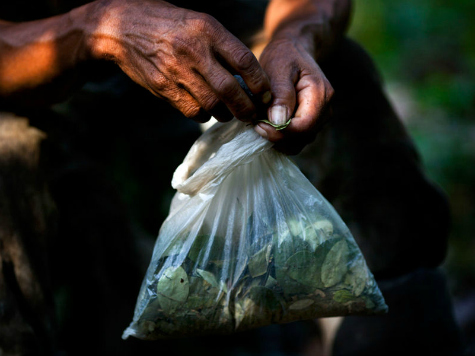
United Nations Secretary General Ban Ki-Moon has decided to celebrate his birthday in Bolivia this year, and in honor of his visit and the festivities at hand, Bolivian president Evo Morales is set to present Ban with a birthday cake made of Bolivia’s most plentiful crop: coca leaves.
Secretary General Ban is set to visit Bolivia on the week of June 12 for the 50-year celebration of the G77+China Summit, composed of 133 nations. Ban is not the only global official to be making the trip, with a number of heads of state slated to attend, but he is the only one with a high-profile 70th birthday that week.
The major of the town of Cobija, where Ban is scheduled to stay, explained that Bolivians wanted to expose the crop to the world in ways that distinguished it from its most popular derivative product, cocaine. “June 15 is his birthday, and we will invite him to a great coca cake,” explained Mayor Ana Lucía Reis. “The idea is that Ban tries the coca and realizes, sees that coca is part of our culture and is not cocaine.”
Coca leaves continue to be a controlled substance under UN provisions, a designation that the Bolivian government has long fought. President Morales, who was the head of the nation’s largest coca growers’ union before taking over the helm of the country, has chewed the leaves and made them available at public events in an attempt to destigmatize them. In January 2013, Bolivia chose to rejoin the United Nations convention on narcotic drugs with a reservation that coca leaves were excluded in their acceptance of the international law – a caveat that met many objections. Bolivia had previously withdrawn from the convention in 1961 in defense of the coca leaf.
That victory aside, promoting the coca leaf has proven difficult for Bolivia. An Associated Press report following the rejoining of the UN convention explained that the attempted differing uses for coca leaves were unpopular even within Bolivia, as “most people seem to find other coca-based food unappetizing.” That appeared particularly true regarding coca-based snacks and sweets, which the government subsidized using a donation from Hugo Chávez.
The coca food project appearing to fail, Bolivia has continued its attempts to explain to the world that coca leaf is not cocaine. The Bolivian government released a study in November 2013 alleging that less than half of the coca grown in the nation was used to develop cocaine. The study did not, however, go far in assuaging the international community that increasing the coca market would be a positive change globally.

COMMENTS
Please let us know if you're having issues with commenting.